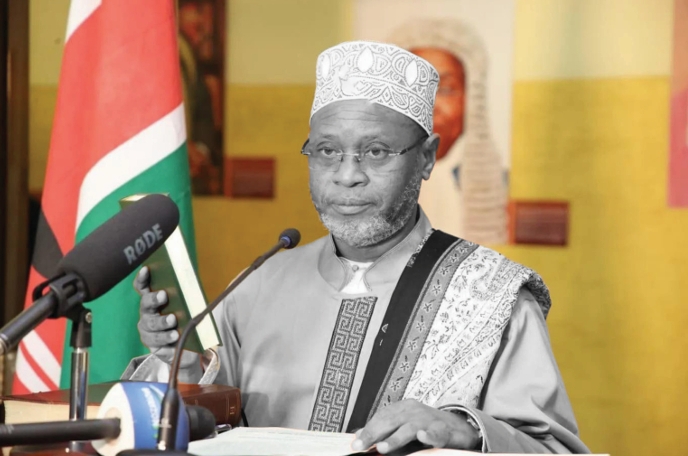When the news of Chief Kadhi Sheikh Abdulhalim Hussein’s death broke, a wave of grief swept across Kenya’s Muslim community and judicial corridors. It wasn’t just the passing of a cleric. It was the departure of a man whose soft-spoken authority and deep understanding of Islamic law had helped bridge faith and justice for thousands of Kenyans.
Sheikh Abdulhalim, who died at 55 after undergoing treatment abroad, was buried in Mombasa under the watchful eyes of religious leaders, judges, politicians, and everyday citizens whose lives he had quietly shaped.
Born and raised in the coastal town of Watamu, Malindi in Kilifi County. Abdulhalim’s early life was marked by modesty and strong religious grounding. He lost his mother while still young, an experience that forged resilience in him and further cemented his spiritual foundations.
His father, a devoted Islamic preacher, raised him under the guidance of local scholars, with faith forming the compass of his upbringing.
Abdulhalim’s education journey began in Kilifi County, where he balanced secular studies with religious instruction. His academic brilliance and discipline earned him a scholarship to Al-Azhar University in Egypt one of the oldest and most prestigious Islamic institutions in the world.
At Al-Azhar, he immersed himself in Sharia law, mastering not only jurisprudence but also the ethical principles underpinning Islamic governance. He returned home with a sharpened mind, a humble heart, and a deep desire to serve.
From Classroom to Kadhi’s Bench
Before donning the robes of a Kadhi, Abdulhalim spent time as a teacher of Islamic Religious Education and Kiswahili. He served in various schools, leaving a quiet but lasting impression on both learners and colleagues. His sense of fairness, ability to listen, and calm presence made him a natural mentor.
In 2005, he was appointed a Kadhi, beginning his judicial career in Mombasa. His journey would later take him to courts in Kwale and Nairobi, each stopping his understanding of the diverse cultural and legal challenges Kenyan Muslims faced.
His courtroom was known for more than just legal arguments, it was a space of mediation, counselling, and spiritual healing. Women, particularly those seeking divorce or child custody, often praised his firm yet empathetic approach.
In July 2023, Sheikh Abdulhalim was appointed the Chief Kadhi of Kenya after a rigorous selection process by the Judicial Service Commission. As the country’s top Islamic judicial officer, he became the face and voice of Kadhi courts tasked with handling matters of personal law for Muslims, including marriage, divorce, succession, and inheritance.
But his vision extended beyond rulings. Abdulhalim believed the Kadhi system could do more to serve Muslims with dignity and efficiency. He advocated for better resources for Kadhi courts, professional training for staff, and increased access for Muslims in remote areas who often lacked judicial support.
Under his leadership, there were notable efforts to streamline how courts managed Islamic marriages and property disputes. He also made strides in digitalising some of the court processes to reduce delays and bureaucracy.
Despite the religious divides that sometimes surface in Kenya’s Muslim community, Sheikh Abdulhalim remained a unifying figure. He often convened scholars from across sects to resolve recurring issues, such as disagreements on moon-sighting during Ramadan and Eid.
He was also vocal about the need to protect and manage Muslim endowment properties known as waqf. In speeches and meetings, he frequently challenged trustees to act transparently and ensure community assets benefitted the poor, the orphaned, and educational causes.
His passion for youth empowerment led him to support initiatives aimed at combating radicalisation and moral decay. He would remind young people that Islam was not just about rituals but also responsibility, knowledge, and community service.
Final Days and Legacy
In his final months, Sheikh Abdulhalim sought specialised treatment in India. Upon returning to Kenya, his health deteriorated, and he passed away in July 10, 2025 in Mombasa. His death prompted an outpouring of tributes from senior judges to coastal governors, Muslim leaders, and ordinary Kenyans.
“He was a scholar who served with humility, a judge who never raised his voice, and a leader who lived by example,” said one fellow Kadhi during the funeral prayers held at Masjid Nuru in Bondeni, Mombasa.
His burial at Kikowani Cemetery was attended by hundreds. Flags at Kadhi courts flew at half-mast. Messages poured in from State House and religious councils alike, mourning a man whose spiritual and legal influence reached far beyond the bench.
The Mark He Leaves Behind Chief Kadhi Sheikh Abdulhalim Hussein’s death leaves a void, not just in the judicial system, but in the heart of Kenya’s Muslim leadership. In a time where polarisation often dominates, his steady presence, deep scholarship, and ethical leadership became a model for what public service should look like.
For young scholars, his life is a reminder that faith and reason are not in conflict. For legal minds, he demonstrated that justice, when delivered with compassion, transforms lives. And for the nation, he leaves behind a legacy of quiet greatness rooted in service, humility, and the pursuit of fairness.
As the country prepares to appoint a new Chief Kadhi, one thing is clear: Sheikh Abdulhalim set a standard that will be hard to match.
By HASSAN HUSSEIN




